Our project plan
As part of our climate change strategy, we are working with communities across Surrey to plant a tree for every one of our residents by 2030. That is 1.2 million new trees.
Our strategy outlines five key objectives that frame our work:
- Leading by example
- Partnership working
- Right tree in the right place
- Effective planting and aftercare
- Valuing our green infrastructure
By embracing these objectives, we are making good progress to meet our goal by 2030.

1.2 million new trees
Surrey County Council is working in partnership with you and your communities, schools, businesses and charities, as well as our local district, borough and parish councils, to plant the right trees in the right place.
We are taking the lead to make sure we look after and protect young trees and help them grow and establish into strong, healthy mature trees.
As a major landowner in Surrey, we are finding places on our own land where individual trees and woodlands can be planted to increase tree cover.
We are also valuing our existing green infrastructure by managing our own woodlands effectively and looking at planning policy to support, where appropriate, the safeguarding of existing trees and planting on new housing developments.
Why it is important to plant trees
Trees help ease the effects of climate change. Their leaves and branches shade the ground and their root systems help prevent flooding. They also play a key role in capturing and storing carbon dioxide. Trees improve air quality and biodiversity to make our communities healthier, greener and more sustainable. For more information, email us at trees@surreycc.gov.uk. You can also find out about planting trees on the highway.
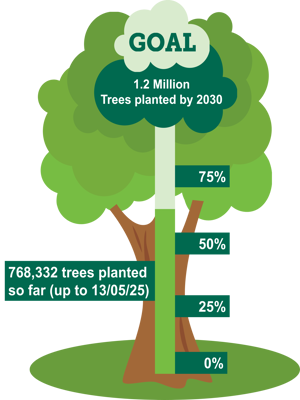 Progress so far
Progress so far
Together with our partners, we are making great progress towards our goal of planting 1.2 million trees by 2030.
Since the launch of the initiative in 2019, over 768, 832 trees have been planted across Surrey. This figure is a combination of cumulative planting across Surrey County Council's land portfolio, partner sites and other external Surrey planting. Working with our partners, we have delivered planting projects across the county. All our planting is delivered against our five objectives, and ensures we always plant the 'right tree in the right place'. Our Tree Planting and Establishment team has worked hard to engage community groups, charities and schools planning projects, offering support and advice on planting and aftercare
Where have we planted trees?
This map shows where we have planted trees so far. See how many have been planted in your community and add your own planted tree or hedgerow to Surrey's New Tree Strategy Interactive Map.
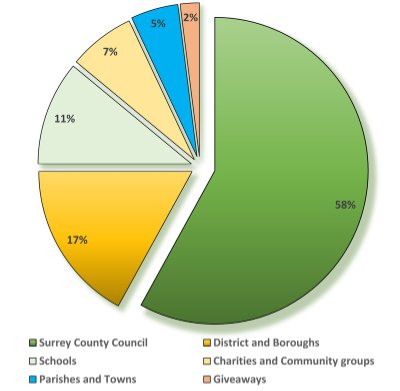 Who has planted trees?
Who has planted trees?
This chart shows trees planted by councils, schools, community groups and individuals since the project began in 2019.
We are delivering through a combination of planting projects from Surrey County County land portfolio, and working with our partners for wider planting across Surrey. There are multiple schemes that offer varying benefits to individual sites and communities. These include: planting copses, community orchards, improving school land, boundary hedging and the creation of new woodlands. We also work with our highways team to plant more urban street trees and schemes on our rural highway verges.
| Who has planted trees | Percentage of trees planted |
|---|---|
| Surrey County Council | 58% |
| District and Borough Councils | 17% |
| Schools | 11% |
| Charities and Community groups | 7% |
| Parishes and Towns | 5% |
| Giveaways | 2% |
Surrey County Council land
To fulfil our pledge of leading by example, we deliver planting projects on our own land portfolio. These include a community orchard in Warlingham, new hedgerows planting on our tenant farms and tree cover on large highway verges. We are identifying projects to increase our canopy cover and new tree planting for residents to access and enjoy. Putting biodiversity first, we design our projects for the future to build climate resilience. Where possible, we support our district councils and borough councils to plant on their landholdings.
Working with schools
At this stage in our project, we are delighted to have worked with over 100 schools to plant on their school grounds. This includes planting trees to enhance forest schools and outdoor learning spaces, planting fruit trees and creating shade. We aim to help schools improve biodiversity and educate their students about the benefits of tree planting. These projects are school-led with our Schools Arboricultural Officer offering their expertise to support the design of planting projects and species choices, as well as guidance on funding opportunities and helping volunteers plant and deliver aftercare to achieve planting success.
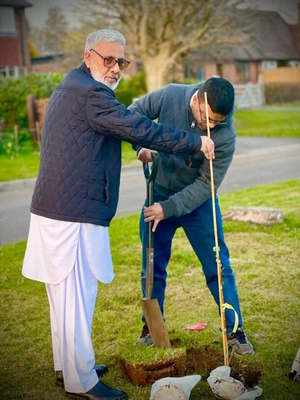 Supporting parish councils, charities and community groups
Supporting parish councils, charities and community groups
Our Tree Planting Volunteer Coordinators work with communities to increase new tree planting within charities, community groups and parish councils. They offer specialist project planning advice and increase partner engagement for county-wide support. Their role ensures great communications, robust planting schedules and programmes of establishment, to ensure that we are planting the right trees in the right places in the right way. The team has delivered multiple projects and schemes to attract a cohesive group of volunteers who plant trees, deliver aftercare and support our community planting in over 130 community groups.
We also work with the Surrey Tree Wardens who contribute their time, further support and expertise to these projects.
Engagement events
Our engagement events offer free trees to residents, together with guidance on planting trees and funding opportunities. We work with colleagues in Surrey's libraries to run Tree Library Giveaways to enable residents to create their own greener future across their communities. These 'giveaways' offer residents a chance to plant trees in their gardens and learn more about our project.
Best Practice planting and aftercare of our new trees
All our planting is designed with climate resilience at the forefront. We make targeted decisions for our species selection. Every planting scheme is designed with a robust aftercare plan to ensure the trees thrive and survive.
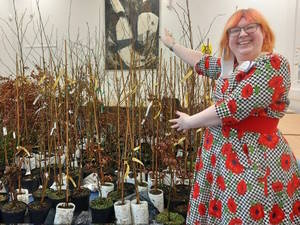 Planting for future seasons
Planting for future seasons
Moving into future planting seasons, our project will continue to evolve in line with our strategic objectives, with biodiversity and sustainability in mind. We will continue to innovate, work with landowners and farmers, run engagement events, reach out to volunteers and communities, and deliver projects to benefit both residents, nature recovery and the environment.
For more information, email us at trees@surreycc.gov.uk
Get involved
Here is information about how you can get involved and help us towards our goal of planting 1.2 million trees in Surrey by 2030.
How can you plant a tree?
A core part of our plan to plant 1.2m trees by 2030 is to work in partnership with residents, communities, schools, businesses and charities, as well as our local district, borough and parish councils. If you would be interested in tree planting on your site, or would like further information, please fill out our short form.
Become a volunteer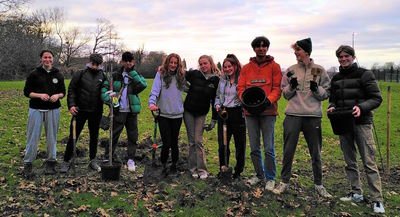
Surrey County Council has set an ambitious target of planting 1.2 million trees in Surrey by 2030. That is one tree for every resident in the county. To achieve this goal, we need your help. Please do join us on this journey and help us plant trees.
You can get outside in the fresh air and do some gentle physical activity to keep fit and improve your mental wellbeing. Other positive benefits include:
- Learn new skills at a short workshop about tree planting and environmental benefits
- Meet like-minded people
- Make difference to your local community
- Make a positive contribution towards the climate emergency
- Create habitats for some of our endangered wildlife
- Leave a legacy for future generations: your great-grandchildren might one day be sitting in the shade of a tree that you planted.
What roles are there?
- Clearing the ground before the Tree Planting Day which could include clearing weeds by hand
- Planting whips (saplings), feathers (young trees with side branches) or standard trees (more mature larger trees)
- Watering the trees in the summer months, weeding around the base and topping up mulch where appropriate
- We also need people to help with logistics on the day. This might include welcoming volunteers to the Tree Planting sessions and delivering trees around the site for people to plant.
See our What's On in the Countryside web page for any upcoming events.
Tree planting funding available
- The majority of funding for woodland creation is facilitated by the Forestry Commission. See more details about Woodland Management. For more information, email us at trees@surreycc.gov.uk
- England Woodland Creation Offer (EWCO) provides funding to support new woodland creation projects for areas greater than 1 hectare in size. Funding covers 100% of the costs for capital items and activities, ten years of maintenance payments, plus added additional contributions.
- Woodland Creation Planning Grant (WCPG) provides funding to support a woodland creation plan, ensuring compliance with the UK Forestry Standard. This planning can then be used to support other funding bids, such as the EWCO.
- MOREwoods provides funding from the Woodland Trust to plant at least 500 trees on land larger than 0.5 hectare in size. Funding covers up to 75% of the cost of the trees and up to 60% of the cost of a contractor.
Other tree planting schemes:
- MOREhedges provides funding from the Woodland Trust
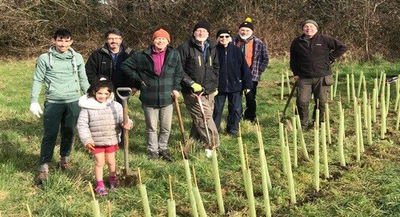 to plant at least 100m of new hedging, allowing a large tree to grow every 6m. Funding covers up to 75% of the costs of the project.
to plant at least 100m of new hedging, allowing a large tree to grow every 6m. Funding covers up to 75% of the costs of the project. - Free Trees for Schools and Communities provides tree packs from the Woodland Trust for schools and community groups, ideal for hedgerows and copses. You can select up to four packs (maximum of 420 trees total) and the scheme is completely free.
- Branching Out Fund provides funding from The Tree Council to support schools, community groups and tree wardens to plant trees, hedges and orchards. Projects can range in size from £250 up to £2500.
If you would like to plant trees on your land, email us at trees@surreycc.gov.uk to see how we can support you.
Guide to planting trees
Here is a step-by-step guide to planting trees with links to useful information on other websites. You can also find out about planting trees on the highway.
Check your soil type
There are four main soil types: chalk, sandy, silt and clay. There is also loam soil which is a mix of silt, clay and chalk, and sits somewhere in the middle of the main four. Some trees prosper in all soil types (eg, Silver Birch and Hornbeam) but others do best in specific soil types.
The level of hydrogen in soil is an indicator of how plants and trees will grow and is measured in potential Hydrogen (pH) units. Soil types have different pH numbers. Here are some ways to check the pH number:
- Use a pH testing kit available at garden centres
- Look up your postcode on the Soilscapes Soil Type Viewer
- Watch 'How to identify your soil type' video from the The Royal Horticultural Society (RHS)
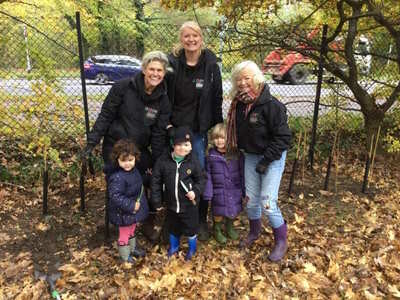 Choose your tree
Choose your tree
Here are some key things to think about when selecting a tree.
Pick the appropriate species for the space you have available. If you have limited space, pick a small or narrow species so it has room to grow larger.
If you are planting a hedgerow, be sure to select a hedgerow tree. Some trees, such as Sycamore, self-seed very easily which may not work in the area available.
Some trees prefer shadier areas and some like to be in full sun. Consider how much light is available in the area where you plant.
Useful resources
- Browse different types of trees on the RHS website.
- Information about trees and shrubs on The Wildlife Trusts website.
- An A to Z of British trees on The Woodland Trust website.
What size tree?
If you are planting woodlands, hedges or clusters of several trees (known as copses), it is best to buy saplings, also known as 'whips'. These are young trees (around two-years-old) which are 20 to 60cm tall with no side branches.
If you are planting fruit trees or individual trees, it is best to buy 'feathered' trees (1 to 1.7m tall) or even 'standards' (2m to 4m tall). These are larger, older trees that will have more initial impact. However, the younger a tree is when it is planted, the more likely it is to establish its root network and survive to maturity.
Planting your tree
The best time to plant trees is from November to February. Small trees and saplings look like twigs at this stage but if you can see buds on the tree, it is alive.
How you plant your tree will depend on its age.
Saplings/whips
It is best to plant saplings (also known as 'whips') with a spiral guard and cane/stake to stop them getting chewed and/or eaten by rabbits and small rodents. Biodegradable and plastic-free guards are now available.
- See this video on YouTube from The Woodland Trust about how to plant a tree.
- See this video on YouTube from The Tree Council about how to plant trees and hedgerows.
Feathers/standards
Feathers and standards do not require guards. Strap them to a supporting cane/stake. The strap should be loose enough so the tree can still move around in the wind. This will help the tree adapt to the wind so it will not fall over when the strap is removed.
- See this video on YouTube from crocus.org.uk about how to plant a larger tree.
- See this video on YouTube from garden.org on how to plant a tree step by step.
Mulch
When you have planted your tree, you should apply some mulch around it. Mulch can be made of partially decomposed woodchip, or you can also use organic compost. This should be no thicker than about 8 cm and applied in a circle around the tree.
When applying mulch, it is important it does not touch the tree stem as this could cause it to rot. Mulch provides lots of benefits to your tree, such as increased water retention, a source of nutrients, and frost prevention.
Looking after your tree
A tree takes approximately three years to become established. During this time, it needs looking after and watering. You can use recycled water – this includes bath water, washing-up water, water left over from cooking vegetables or water from a condenser tumble dryer.
Saplings/whips do not need watering initially, as the trees themselves are very small. However, if there is a lack of rain or drought they may need to be watered where possible.
Feathers/standards need to be given approximately 50 litres of water a week between April and September. For more information about watering your trees please see the links below:
- See Top 10 tips from The Tree Council for watering trees in a drought
- See guidance from The Arboricultural Association on watering young trees in dry weather
- For more information, email us at trees@surreycc.gov.uk
- You can also find out about planting trees on the highway.
Events
The Tree Planting Team at Surrey County Council are seeking volunteers for their winter tree planting events running from November 2024 through to February 2025, helping to plant new trees and meet the Council's 1.2million tree planting target! All events can be booked via Eventbrite.
2025
February
Tree planting in West Park Farm, Newchapel, between Lingfield & Horley
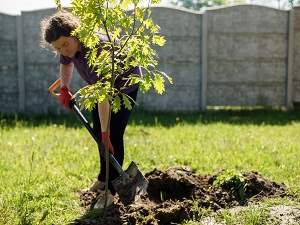
The Tree Planting Team at Surrey County Council are seeking volunteers to help with planting over three days in West Park Farm, Newchapel. No experience needed, just wrap up warm, bring a spade and join in!
- Date: Tuesday 25, Wednesday 26 and Thursday 27 February
- Place: West Park Farm, Newchapel, between Lingfield & Horley
- Time: 10am to 1pm and 1pm to 3.30pm sessions
If you are interested in volunteering please register through the links below:
- Tuesday 25 February 10am to 1pm session
- Tuesday 25 February 1pm to 3.30pm session
- Wednesday 26 February 10am to 1pm session
- Wednesday 26 February 1pm to 3.30pm session
- Thursday 27 February 10am to 1pm session
- Thursday 27 February 1pm to 3.30pm session
Also visit our Environment volunteering ideas and What's on in the countryside web pages for other events happening in Surrey's countryside.

